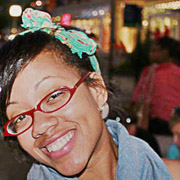Elevation Q&A: Eboni-Rose Thompson, education advocate in Ward 7
Christina Sturdivant |
Tuesday, September 17, 2013
School is back in session and students, leaders and educators are gearing up to make this year D.C. Public Schools’ best yet.
The school system still needs substantial improvements, however. East of the river, Eboni-Rose Thompson has joined the forces pushing for change as chair of the Ward 7 Education Council.
This native Washingtonian, who works as a program specialist for Save the Children by day, spoke to Elevation DC on how she believes the long-term success of DCPS can benefit students and the local economy.
Growing up as a student in the D.C. public school system, what do you see that has changed the most?
First of all, there were a lot more schools. I remember when I was in kindergarten, they were actually going to close my school, Plummer Elementary—that was 20 years ago. So, that’s actually been happening a lot longer than people care to admit, it really didn’t start with Michelle Rhee.
And because there were a lot more options, including magnet schools, you didn’t see as many people having to commute across town to get to school—not saying no one did it—but it wasn’t accepted as what everyone had to do.
And of course there were very few charter schools until 1998. That was a new idea.
Would you say that you are a part of the D.C. education reform movement?
I think everybody is, whether they realize or not. Anybody who makes a decision as far as where their child goes to school is a part of the education reform movement.
I think the difference is I have a title that says its what I’m supposed to be working on. But I don’t know too many people who would have a legitimate case for separating themselves from education reform in the District of Columbia.
What is your main agenda with the Ward 7 Education Council?
A lot of it has to do with capacity building—and I think sometimes when people think about capacity building, they’re like, "We have to teach parents how to be parents," and I think that’s insulting. I don’t think anywhere you can start off a conversation and say, "I’m going to teach you how to do what you’re already supposed to be doing."
So for us, its more thinking about making opportunities to have parents’ voices be heard and make them feel like they’re a part of that conversation, and doing a better job of letting people know where opportunities are for them to support their schools—from coming to back to school nights or doing a book bag drive, and really building relationships so that we can have strong schools.
How would you describe the overall state of public education in D.C. right now?
I think we’ve gone from education reform being a tagline and everyone agreeing that everything was horrible, to a place where some things have worked. But it’s a much more difficult jump to go from bad and getting to be okay, than it is to go from getting to be okay to great. And that’s where we are.
And it takes a lot more finesse, tact and skill. And I’m hoping that we’ll see a shift in the way we do business. That’s one of the reasons parents, community members and educators need to be a lot more engaged.
If there was a secret formula to better serve students in the District, what would it consist of?
It doesn’t exist, it really doesn’t. But I would say that it would have to be something that permeates every level of education. So it would have to be something that touched the parents, students, teachers, principals, central office and—at this point—the mayor.
Of course it would mean resources that schools need—curriculum, a comprehensive plan for facilities and how children advance through the school system. It would have to be both vertical and horizontal planning.
And it would have to be living, flexible and adaptable. So when we think of organizations that had the most success or documents that withstood the test of time, they had to make changes and adjustments to do so, so it would have to be some variable built into that formula that allows for the unknown, for change.
How do you think success should be measured for D.C. schools and students?
I think a great measure for success is actually once students are out of the school system. So, not just if they graduate, but what happens after they graduate. We know our schools haven’t been doing the greatest because we have such a high rate of unemployment among native Washingtonians.
So measure how many students get to college and come home with degrees, because that’s what our economy in D.C. is. It’s not Ohio, where people can graduate with a high school diploma and then work in a factory. We don’t have that. It’s a service economy. And we actually have more people per capita with Ph.Ds than any other place in the country, so if our students are going to be able to compete and stay in D.C., they have to be prepared to become the Ph.Ds—so that’s the longer formula for success.
This interview has been edited and condensed.

Christina Sturdivant is a native Washingtonian who's always watching and writing about the latest cultural, community and innovative trends in the city. She's interested in people and companies that create equitable opportunities for longtime residents and transplants alike.